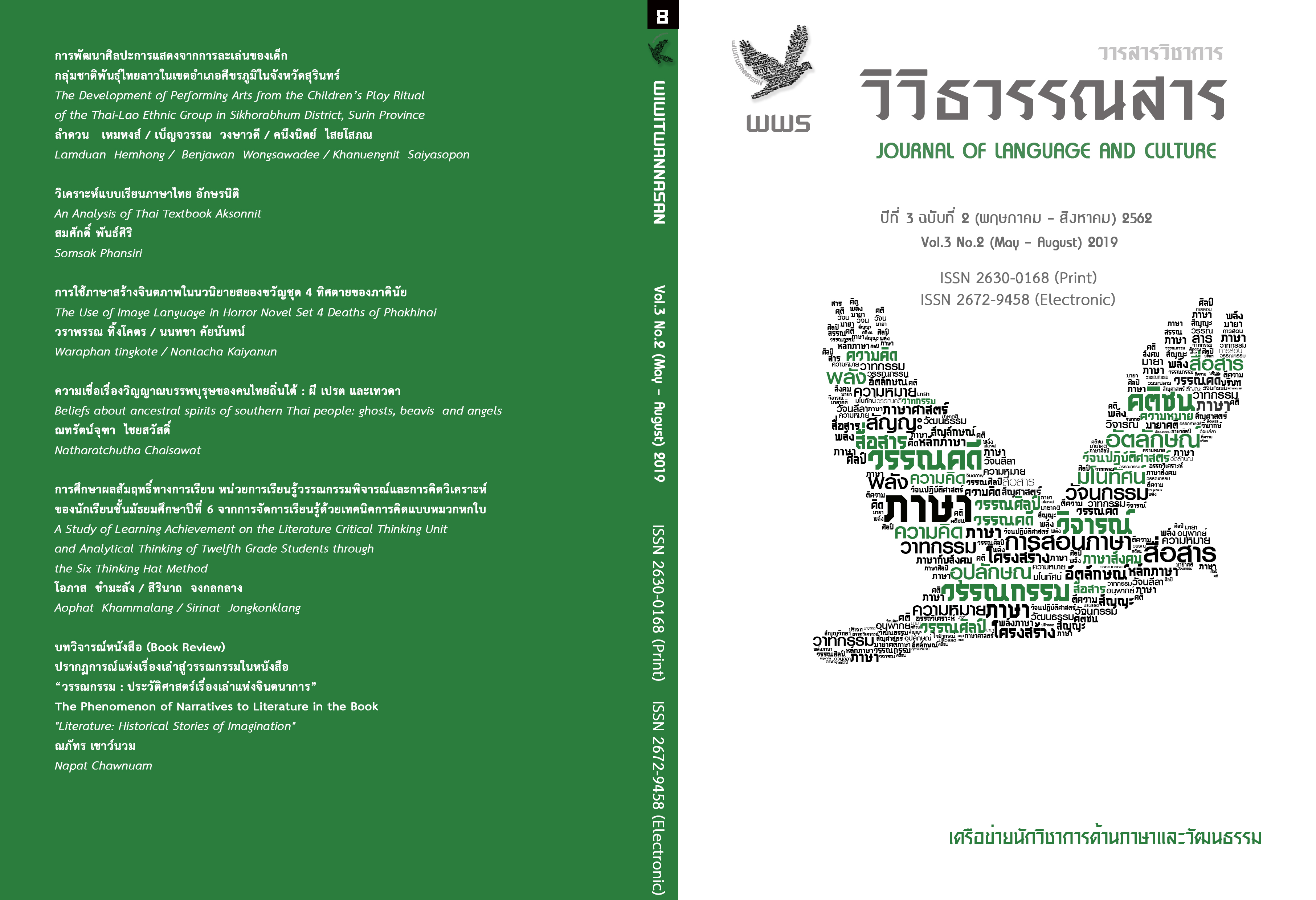มนุษย์ สัตว์ เปรต และเทวดา ความเชื่อเรื่องผีบรรพบุรุษของคนไทยถิ่นใต้
Main Article Content
บทคัดย่อ
ตำนานเรื่องเล่าท้องถิ่นไทยภาคใต้หลายเรื่องได้กล่าวถึงความเคารพนับถือที่ผู้คนมีต่อบรรพบุรุษที่ล่วงลับไปแล้ว บ้างก็ว่าเมื่อล่วงลับไปแล้วบรรพบุรุษซึ่งเคยสร้างความดีเอาไว้เมื่อครั้งเป็นมนุษย์จะเกิดใหม่ในอีกภพภูมิหนึ่งเป็นสิ่งที่เรียกว่าเทวดา แต่หากครั้งมีชีวิตอยู่บรรพบุรุษเหล่านั้นกระทำความชั่ว เมื่อตายไปดวงวิญญาณจะไปเกิดเป็นเปรต บ้างก็ว่าบรรพบุรุษเหล่านั้นกลายเป็นสิ่งศักดิ์สิทธิ์ที่ปรากฏอยู่ในรูปของ คนบ้างสัตว์บ้าง ต้นไม้บ้าง ซึ่งล้วนแล้วแต่มีอิทธิฤทธิ์สามารถแสดงปาฏิหาริย์ ทำหน้าที่ปกป้อง คุ้มครอง ปัดเป่าทุกข์โศกหรือภยันตราย ตลอดจนสามารถดลบันดาลสิ่งดี-ร้ายต่าง ๆ ให้เกิดขึ้นแก่คนที่ยังมีชีวิตอยู่ได้ทั้งสิ้น
การศึกษาครั้งนี้เป็นการศึกษารวบรวมประเภทของความเชื่อเกี่ยวกับผีบรรพบุรุษของคนใต้ทั้งเรื่องวิญญาณศักดิ์สิทธิ์และเรื่องเปรตให้ร้อยเป็นเรื่องเดียวกันและอธิบายว่าความคิดความเชื่อที่พิสูจน์ยากเหล่านี้มิได้เป็นเพียงความคิดงมงายของผู้ที่หาคำตอบทางวิทยาศาสตร์ไม่ได้เท่านั้น แต่กลับมีบทบาทสำคัญต่อการควบคุมคนและพัฒนาศักยภาพสังคมได้เช่นเดียวกันกับหลักการและทฤษฎีที่มีข้อพิสูจน์ชัดเจนอื่น ๆ เนื่องมาจากคนไทยท้องถิ่นภาคใต้มีความกตัญญูรู้คุณต่อบรรพบุรุษ เสมือนความกตัญญูรู้คุณต่อญาติผู้ใหญ่ที่ยังมีชีวิต ในขณะเดียวกันก็ต้องการการปกป้องคุ้มครองเสมือนที่ต้องการจากผู้ใหญ่ในครอบครัว
Article Details
ลิขสิทธิ์ของบทความเป็นของวารสาร การพิมพ์ซ้ำจะต้องได้ร้บการอนุญาตจากบรรณาธิการวารสาร
เอกสารอ้างอิง
(In thai) [Study the Myths and Beliefs about the Tuat in the Satingphra Peninsula. Songkhla]. Bachelor's Thesis,
Thai folklore, Thaksin University, Songkhla.
Chairot, K. (2006). Tuat nai rup sat (tuatngu tuatchorake tuatchang lea tuatsuea). (In thai) [Sacred Animals (Sacred
Snakes Sacred Crocodile Holy Elephant and the Sacred Tiger)]. Songkhla: Wanida Printing.
Haotrakun W. (2017). Sueksa khwamchuea rueang pret nai prapheni sat duean sip : korani sueksa prachakon tambon
naimueang Amphoe Mueang Changwat Nakhon Si Thammarat. (In thai) [A Study of Beliefs in Beavis in the
History of Sat Duean Sip: A Case Study of Population in Nai Mueang Subdistrict, Mueang District, Nakhon Si
Thammarat Province]. journal of Nakhon Lampang Buddhist College. 6(2): 9-18.
Inthamano, S. (2011). Tuat : lomhaichai haeng kan damrong yu nai krasae khwam thansamai. (In thai) [Tuat: A breath
of existence in the modern trend]. Master's Thesis, Prince of Songkhla University.
Ninlakan, L. (2018). “watthanatam khwamchuea kap kanchatkan sattha khong chumchon”. (In thai) [“Culture, Beliefs
and Community management”]. Narkbhut Paritat Journal Nakhon Si Thammarat Rajabhat University, 10(2): 11-
20.
Royal Institute. (2011). Photchananukrom Sap Wannakhadi Thai samai Sukhothai Traiphumphraruang. (In thai) [Thai
Literature Dictionary in the Sukhothai Period, Trai Phumphraruang]. (2nd ed.). Bangkok: Royal Institute.
Rueangnarong, P. (2016). wannakam lae pasa thin tai. (In thai) [Literature and Southern Dialects]. Bangkok:
Sathapornbooks.
Rueangnarong, P. (2010). 100 Rueang mueang tai. (In thai) [100 Stories of Southern Thai]. Bangkok: Amarin.
Sakunasing, L. (2013). Khwamchuea lae prapheni: koet taengngan tai. (In thai) [Beliefs and Traditions: Birth, Marriage,
Death]. Bangkok: Phrao Press (2002).


